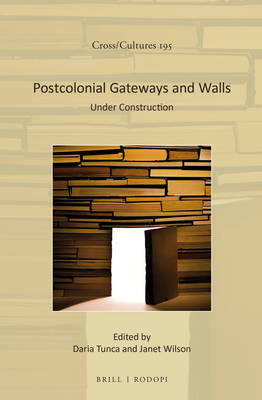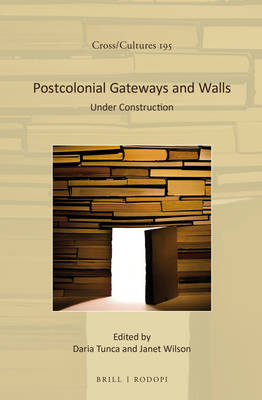
- Retrait gratuit dans votre magasin Club
- 7.000.000 titres dans notre catalogue
- Payer en toute sécurité
- Toujours un magasin près de chez vous
- Retrait gratuit dans votre magasin Club
- 7.000.0000 titres dans notre catalogue
- Payer en toute sécurité
- Toujours un magasin près de chez vous
253,45 €
+ 506 points
Description
Metaphors are ubiquitously used in the humanities to bring the tangibility of the concrete world to the elaboration of abstract thought. Drawing on this cognitive function of metaphors, this collection of essays focuses on the evocative figures of the 'gateway' and the 'wall' to reflect on the state of postcolonial studies. Some chapters - on such topics as maze-making in Canada and the Berlin Wall in the writings of New Zealand authors - foreground the modes of articulation between literal borders and emotional (dis)connections, while others examine how artefacts ranging from personal letters to clothes may be conceptualized as metaphorical 'gateways' and 'walls' that lead or, conversely, regulate access, to specific forms of cultural expression and knowledge.
Following this line of metaphorical thought, postcolonial studies itself may be said to function as either barrier or pathway to further modes of enquiry. This much is suggested by two complementary sets of contributions: on the one hand, those that contend that the canonical centre-periphery paradigm and the related 'writing back' model have prevented scholars from recognizing the depth and magnitude of cross-cultural influences between civilizations; on the other, those that argue that the scope of traditional postcolonial models may be fruitfully widened to include territories such as post-imperial Turkey, a geographical and cultural gateway between East and West that features in several of the essays included in this collection.
Ultimately, all of the contributions testify to the fact that postcolonial studies is a field whose borders must be constantly redrawn, and whose paradigms need to be continually reshaped and rebuilt to remain relevant in the contemporary world - in other words, the collection's varied approaches suggest that the discipline itself is permanently 'under construction'. Readers are, therefore, invited to perform a critical inspection of the postcolonial construction site.
CONTRIBUTORS
Vera Alexander - Elisabeth Bekers - Devon Campbell-Hall - Simran Chadha - Carmen Concilio - Margaret Daymond - Marta Dvořák - Claudia Duppé - Elena Furlanetto - Gareth Griffiths - John C. Hawley - Sissy Helff - Marie Herbillon - Deepika Marya - Bronwyn Mills - Padmini Mongia - Golnar Nabizadeh - Gerhard Stilz
Following this line of metaphorical thought, postcolonial studies itself may be said to function as either barrier or pathway to further modes of enquiry. This much is suggested by two complementary sets of contributions: on the one hand, those that contend that the canonical centre-periphery paradigm and the related 'writing back' model have prevented scholars from recognizing the depth and magnitude of cross-cultural influences between civilizations; on the other, those that argue that the scope of traditional postcolonial models may be fruitfully widened to include territories such as post-imperial Turkey, a geographical and cultural gateway between East and West that features in several of the essays included in this collection.
Ultimately, all of the contributions testify to the fact that postcolonial studies is a field whose borders must be constantly redrawn, and whose paradigms need to be continually reshaped and rebuilt to remain relevant in the contemporary world - in other words, the collection's varied approaches suggest that the discipline itself is permanently 'under construction'. Readers are, therefore, invited to perform a critical inspection of the postcolonial construction site.
CONTRIBUTORS
Vera Alexander - Elisabeth Bekers - Devon Campbell-Hall - Simran Chadha - Carmen Concilio - Margaret Daymond - Marta Dvořák - Claudia Duppé - Elena Furlanetto - Gareth Griffiths - John C. Hawley - Sissy Helff - Marie Herbillon - Deepika Marya - Bronwyn Mills - Padmini Mongia - Golnar Nabizadeh - Gerhard Stilz
Spécifications
Parties prenantes
- Editeur:
Contenu
- Nombre de pages :
- 366
- Langue:
- Anglais
- Collection :
- Tome:
- n° 195
Caractéristiques
- EAN:
- 9789004337671
- Date de parution :
- 17-11-16
- Format:
- Livre relié
- Format numérique:
- Genaaid
- Dimensions :
- 160 mm x 236 mm
- Poids :
- 635 g

Les avis
Nous publions uniquement les avis qui respectent les conditions requises. Consultez nos conditions pour les avis.





